-
Everything You Need to Know about Mouthguards
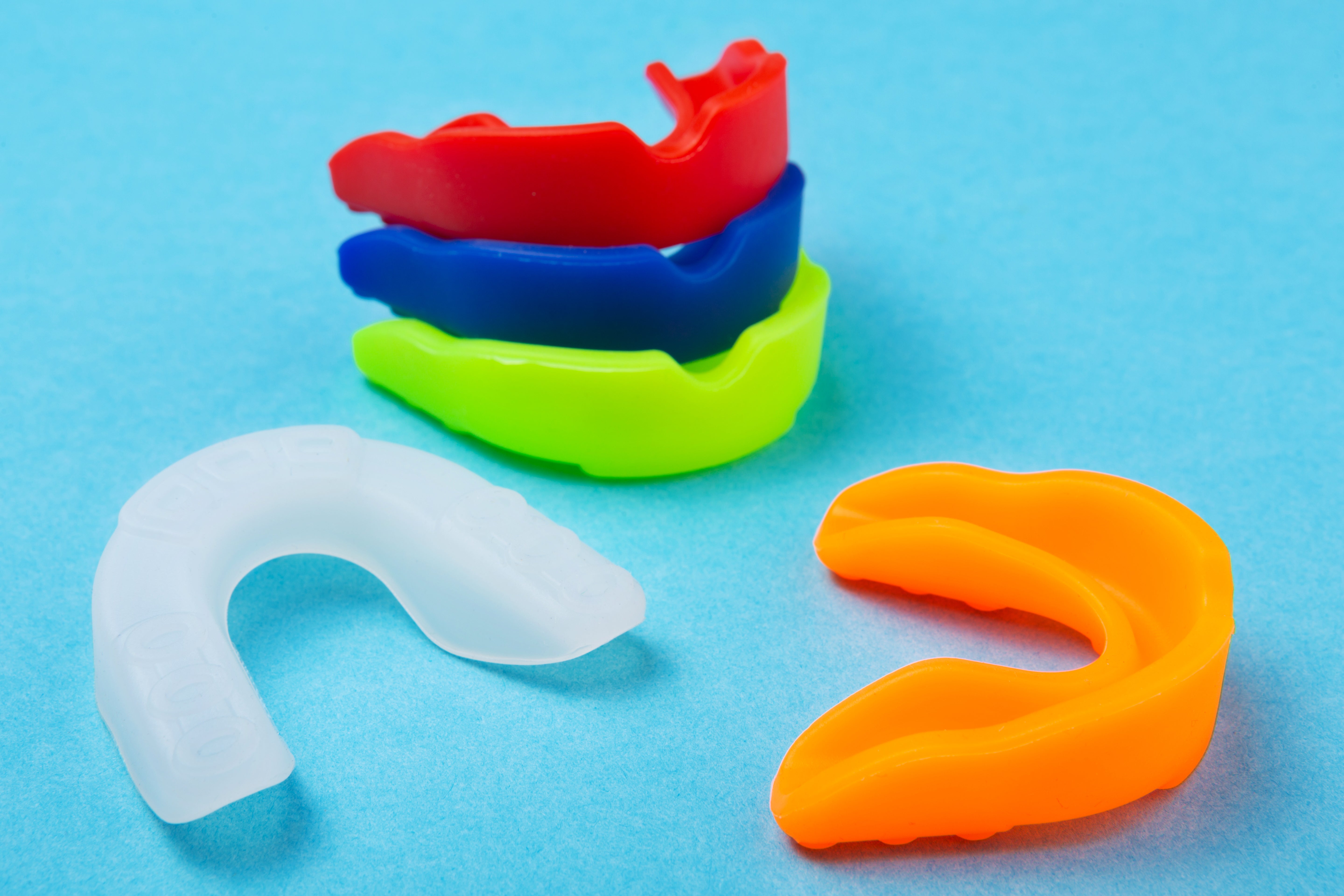
Playing sports can be risky. You could twist your ankle, sprain a wrist, bite your lip, or get a tooth knocked out. While you can’t eliminate all risks when playing sports, you can protect your teeth and lips by wearing a custom mouthguard. Learn more about your options here to help you decide what’s best for you.
What is a Mouthguard?
A mouthguard is an oral appliance designed to protect your teeth, lips, and cheeks from injury while playing sports. Similarly, night guards help prevent damage from nighttime tooth-grinding, also known as bruxism. The American Dental Association (ADA) has specific guidelines for what makes the ideal mouthguard. The appliance should:
- Sit comfortably and securely in the wearer’s mouth
- Cover all the teeth on one or both arches
- Have a resilient design and construction with materials approved by the Food and Drug Administration (FDA)
- Be easy to clean
- Maintain high-impact energy absorption and force transmittance if the wearer is playing sports
Types of Mouthguards
Not all mouthguards are created equal. There are three main types to choose from:
- Stock mouthguards come in various sizes, with most options fitting over the top teeth. This option can be bulky and uncomfortable.
- Boil-and-bite mouthguards are inexpensive options available in most drugstores. You place the mouthguard in boiling water to soften it, and then mold it to your teeth for a better fit than most stock mouthguards can provide.
- Custom-made mouthguards are the best, longest-lasting options available. A dentist makes a mouthpiece just for you, with the perfect fit and maximum comfort.
Do I Need a Mouthguard?
Mouthguards serve different purposes. You should consider getting one if any of the following applies to you:
- You play sports. The ADA recommends mouthguards to protect against chipped teeth, knocked-out teeth, and soft tissue injuries while playing full-contact sports such as hockey, football, lacrosse, and wrestling. Athletes who play non-contact sports can also benefit from wearing a mouthguard.
- You grind your teeth at night. You’ll need to wear a different kind of mouthguard, known as a night guard, to prevent tooth grinding while you sleep.
- You have jaw joint disorder. Temporomandibular Joint Disorder (TMJD) is a condition that causes the muscles around your jaw to become inflamed, leading to tooth clenching and grinding. A specially made mouthguard can help with this.
At Park 56 Dental, we help our patients protect their teeth with Under Armour® Performance Mouthwear™. These advanced mouthguards are custom-made to fit your bite for superior protection and comfort. Under Armour mouthpieces are made from the highest quality materials for safety and durability. Athletes who play sports in college, professional leagues, and the Olympics put their trust in Under Armour, and so can you.
If you’re an athlete looking for the best teeth and mouth protection available, please call Park 56 Dental at (212) 826-2322 or schedule an appointment online today. We offer quick, custom mouthguard fittings that take as little as 20 minutes.
-
Invisalign During COVID Times
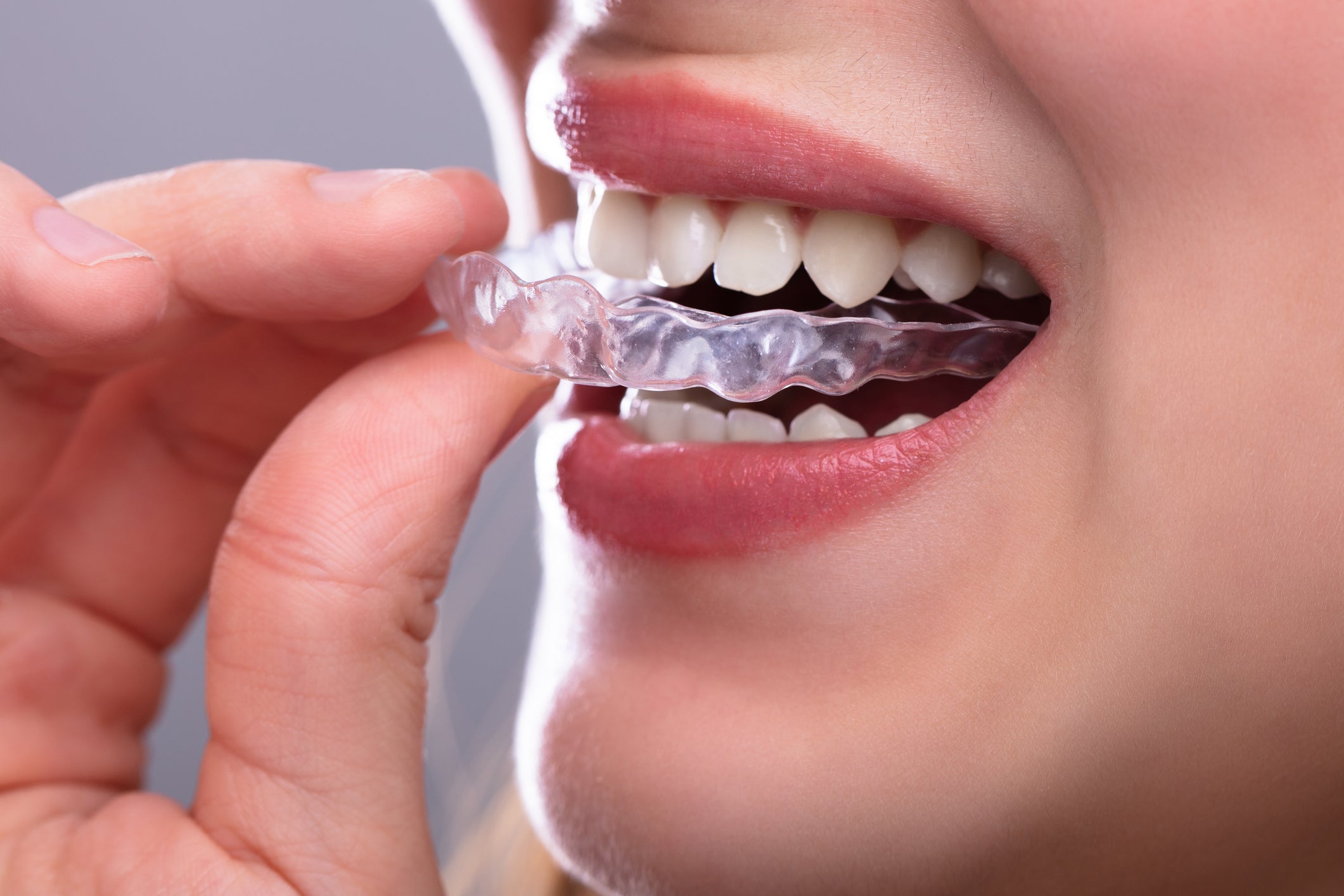
Are you working toward a straighter, more beautiful smile with Invisalign? Perhaps you’re interested in pursuing this wire-free tooth-straightening method, but you’re not sure where to start. After all, the COVID-19 pandemic has altered dental practices and left many patients wondering what procedures are even available at this time.
Rest assured that Park 56 Dental in NYC is open for business! We’ve made a few changes to ensure your safety and comfort while visiting our office. For instance, we provide a pre-visit health screening and contactless temperature check for all visitors and team members. We also offer masks and hand sanitizer upon request, and we maintain social distancing with staggered check-ins and zero wait times.
Whether you’re interested in starting Invisalign or continuing your existing treatment during COVID times, we can meet your needs. Here’s what you need to know.
Beginning Invisalign Treatment
With the safety protocols in place at our New York City dentist office, now is a good time to begin Invisalign treatment. Visit our office for digital X-rays and a scan of your mouth. Thanks to advanced computer technology and your dentist’s expertise, you’ll receive a roadmap of your path to a straighter smile before leaving the office.
Once the plan is finalized, custom aligners are made to fit your existing smile, along with 18 to 30 additional sets of aligners designed to gradually shift your teeth to the desired position over the next nine to 15 months or so. Pick up your aligners from us, and start wearing them to begin seeing a difference within a matter of weeks.
Continuing Your Invisalign Treatment
If you already have Invisalign aligners from before the pandemic, continue to wear them as usual. You should experience no delays in your treatment if you follow these tips:
- Wear your aligners for at least 20 to 22 hours per day.
- If you lose an aligner, move on to the next one.
- If you have any issues with loose or poorly fitting aligners, give us a call.
With today’s heightened focus on hygiene and avoiding illness, you should be extra diligent about keeping your Invisalign aligners clean during COVID times. Here’s how:
- Wash your hands before putting in or taking out your Invisalign.
- Rinse your aligners whenever you remove them, and clean them thoroughly morning and night.
- Never eat or drink anything except water when wearing your aligners.
- Store your aligners in a protective case anytime you take them out.
- Brush or floss before putting your Invisalign back in.
The skilled dentists at Park 56 Dental are ready to help transform your smile with Invisalign. If you’re still working from home during these COVID times, you’re sure to make an impression when you return to work a few months from now with straight, gorgeous teeth!
Want to learn more about the Invisalign process? Ready to schedule a consultation at our New York City dentist office? Call us at (212) 826-2322 or contact us online today.
-
Should You Visit the Dentist During the Coronavirus Pandemic?
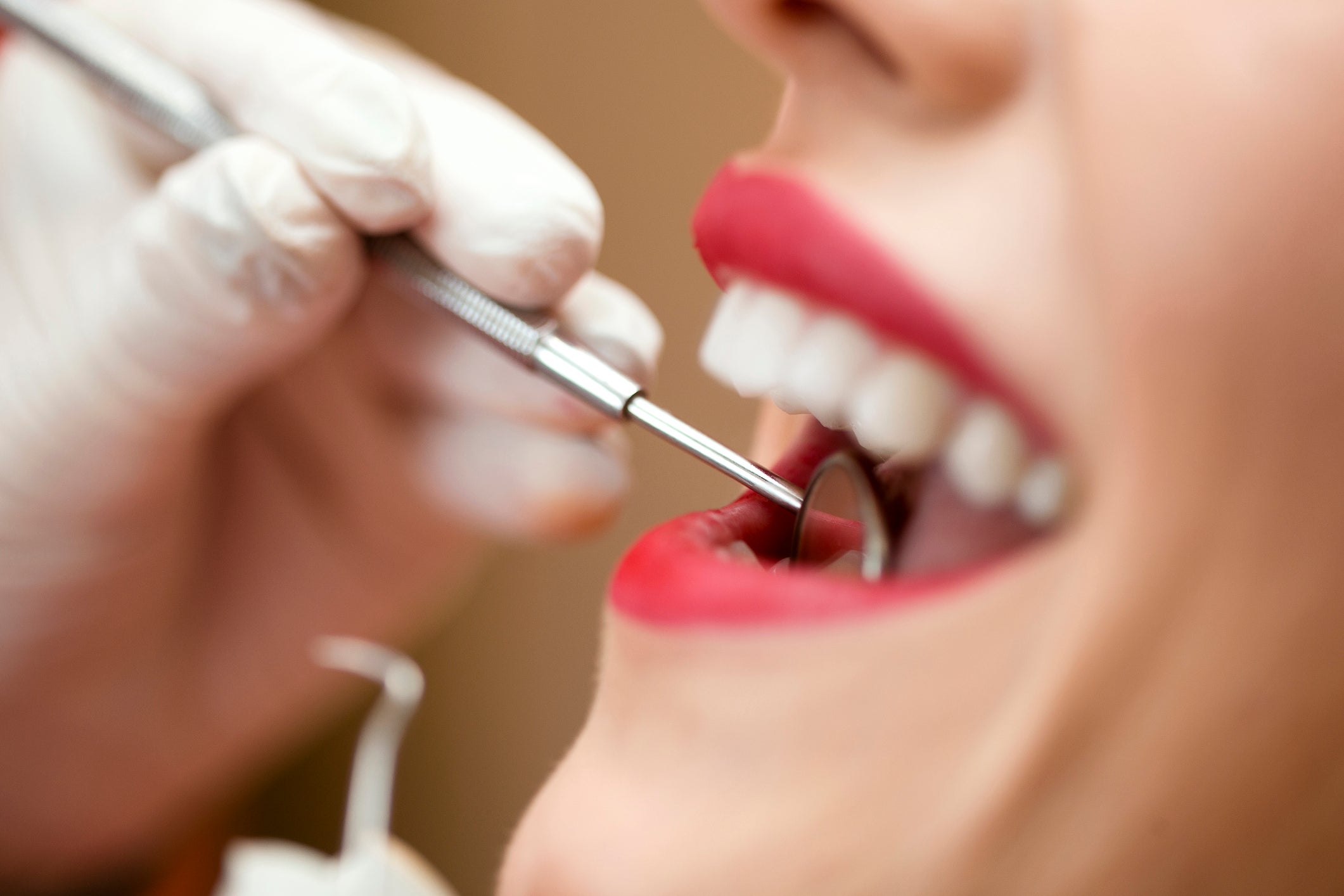
For several weeks in early 2020, dentists in New York City and elsewhere across the globe were required to stop providing non-urgent care in response to the novel coronavirus pandemic. As we resume our “new normal,” many patients are asking—is it still too early to visit the dentist?
Rest assured that the American Dental Association (ADA) and the Centers for Disease Control and Prevention (CDC) are now allowing patients to return to the dentist for routine cleanings, cosmetic dentistry, and other elective services—with a few changes in place. Here’s what you should know before visiting the dentist during the COVID-19 pandemic.
Is My Dentist’s Office Safe?
Germs are everywhere, but healthcare facilities, including dentist’s offices, have always been among the cleanest places you could go. Many safety guidelines have been the norm for years, including regularly washing your hands, sterilizing tools, and discarding certain gear and needles after a single use.
In light of the pandemic, many dentists, including Park 56 Dental in NYC, are doing even more. Here are some of the steps we’re taking to ensure patient safety and comfort:
- Conducting pre-visit health screenings and contactless temperature checks for all visitors and staff
- Making masks and hand sanitizer available upon request
- Staggering check-ins to minimize wait times and help maintain social distancing
- Holding virtual appointments to answer questions or conduct follow-ups
How “Essential” are Dentist Visits?
The fact that dentist offices were shut down for everything but emergency procedures could make some people think that routine teeth cleanings aren’t that important. However, the condition of your teeth and gums can greatly impact your overall health. In fact, putting off routine cleanings could compound dental problems and other health issues in the months and years to come.
The practical precautions that dentist offices are currently taking are effective at reducing the risk of coronavirus transmission while allowing you to care for your teeth and gums. Skipping your appointments any longer than necessary is simply not worth the risk to your oral health.
What to Consider Before Going to the Dentist
Social distancing is the best way to slow the spread of the coronavirus. If you have symptoms of COVID-19, you should self-isolate for 14 days. In short, cancel your dentist appointment if you’re not feeling well. You’ll be sent home if you come in with a cough, fever, or shortness of breath. You should also stay home if you think you have been around anyone who has the coronavirus, whether or not they have tested positive.
Park 56 Dental in NYC is open for business! Anything that can be done remotely, such as payments or health questionnaires, will be handled over the phone or via email. We are taking COVID-19 restrictions seriously and place your safety above all else. Please call us at (212) 826-2322 or contact us online to ask questions about our coronavirus precautions or to schedule an appointment. We look forward to hearing from you soon.
-
What is an All-on-4 Implant Procedure?
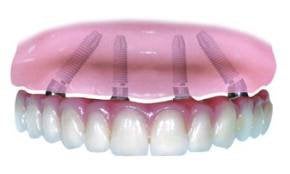
Just a decade ago, most patients were unaware that an All-on-4 implant procedure even existed. Today, many people specifically request this alternative to dentures and traditional full-arch implants. What exactly is this restoration technique, and could it be right for you?
About All-on-4 Implants
All-on-4 implants are a full-arch fixed dental implant bridge. This technology immediately replaces an entire row of teeth. As the name suggests, all the teeth are supported on just four posts that are surgically implanted into your jawbone. The result is a mouthful of healthy-looking, naturally functioning teeth.
Benefits of All-on-4 Implants
If you’re considering dental implants for a full arch of teeth, All-on-4 implants might be the better choice. The procedure is faster, more cost-effective, and requires no bone grafting for most patients. Plus, only four posts are needed compared to six or eight posts. In this way, All-on-4 implants save you time, money, and discomfort compared to traditional full-arch implants.
Then, unlike dentures, All-on-4 implants:
- Are permanent additions to your mouth that can be brushed like natural teeth
- Never have to be taken out
- Require no adhesives
- Support a strong bite force so you can eat all your favorite foods again
- Are comfortable because they are in a fixed position rather than pressing on your gums when you bite and chew
- Allow for the full taste and temperature experience of your food
- Prevent jawbone deterioration
- Help you maintain a healthy facial structure
The All-on-4 Implants Procedure
This technology uses “tilted implants” to increase strength and stability, as well as avoid damage to the sinus cavity in the upper jaw and the nerve canal in the lower jaw. The initial surgery involves installing the implants. A temporary set of teeth is placed over the implants before you leave the office. Once the healing process is complete about six months after surgery, a permanent, custom bridge is placed.
Candidates for All-on-4 Implants
You may be a good candidate for this procedure if you are missing most or all of your teeth on one or both arches. It doesn’t matter whether you already wear dentures or not. Age is also not a limiting factor—as long as you’re in good overall health, you may qualify.
Be prepared to take excellent care of your All-on-4 implants, using many of the same techniques you would expect with natural teeth. Proper care is needed to help your implants last for many years to come. Rest assured that your dental hygienist will review all instructions with you and recommend the best daily oral care plan to fit your needs.
The skilled dentists at Park 56 Dental work with the nation’s top laboratories for access to 3D, digitally guided plans. This ensures expert post placement and flawless prosthetic teeth for a smile you can be proud of! If you’re interested in learning more about the All-on-4 implant procedure, please contact us online or call our New York City dentist office at (212) 826-2322.
-
How to Prevent Gum Disease
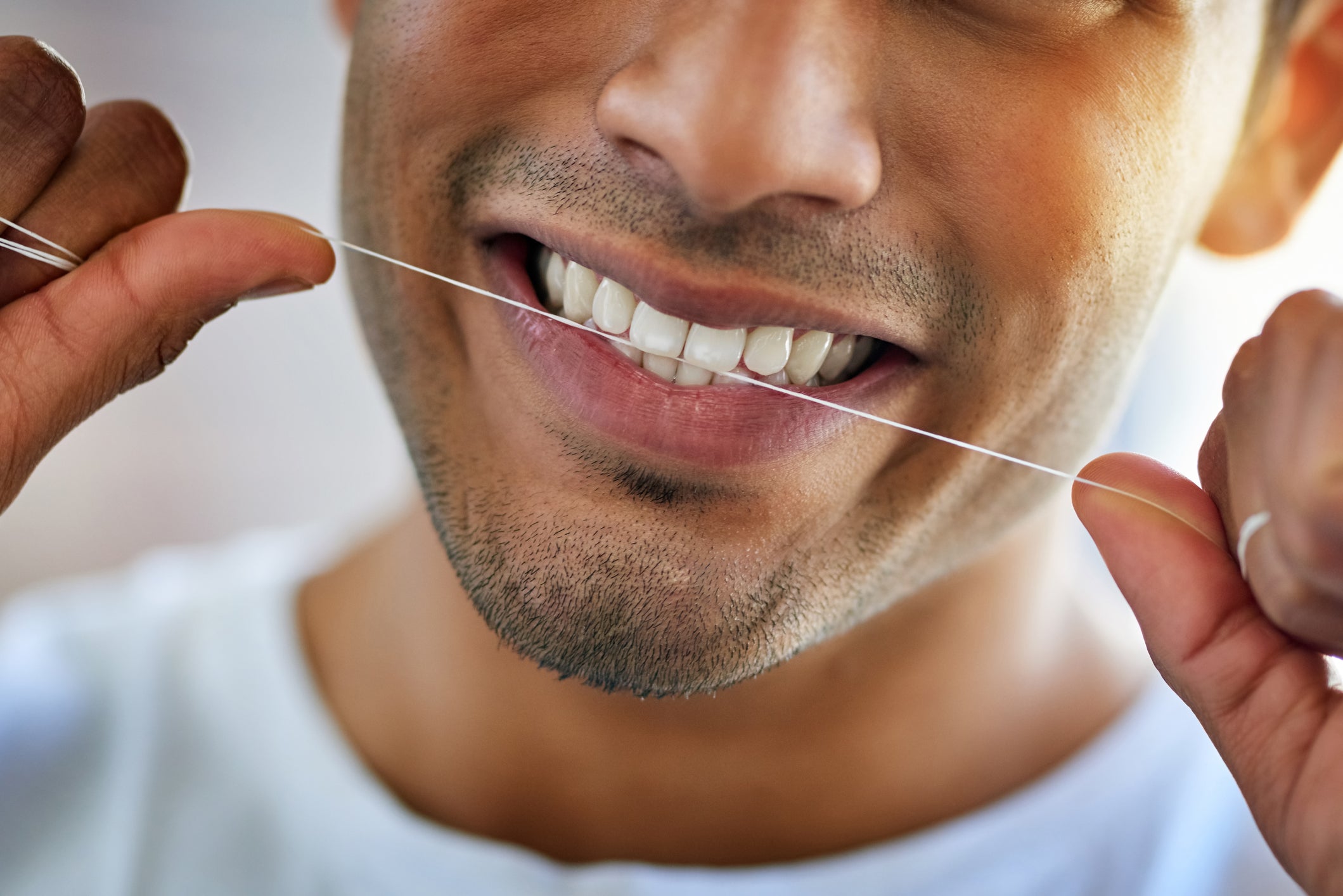
The technical name for gum disease is periodontitis or periodontal disease. This is a common infection that, according to a recent CDC report, affects nearly half of all American adults age 30 and older.
The mildest form of this disease is called gingivitis. Early symptoms include tender and swollen gums, gums that bleed when you brush your teeth, and a receding gum line. If left untreated, periodontal disease can become painful, lead to pussy discharge, and even result in tooth loss. Advanced gum disease can also increase the risk of stroke, heart attack, and other health problems.
Protect yourself from gum disease and the associated side effects by following these preventative tips.
- Brush with fluoride toothpaste. Make this a habit every morning and evening, no matter how busy or tired you are. Use toothpaste that contains fluoride and has the ADA Seal of Acceptance. Choose a soft toothbrush, and brush thoroughly but gently to avoid irritating your gums. Brush for two full minutes, and hold your toothbrush at a 45-degree angle along the gum line so it sweeps away the bacteria hiding there.
- Floss every day. When it comes to preventing gum disease, flossing is arguably more important than brushing because it stimulates the gums and removes debris from between your teeth. The American Dental Association says it doesn’t matter when you floss—do it in the morning, at night, or after lunch—just do it!
- Swish with a medicated mouthwash. All mouthwash products offer some benefits, but some promote gum health better than others. Shop for a version that reduces plaque buildup, slows tartar formation, fights gingivitis, or all three! Remember, mouthwash complements brushing and flossing—it doesn’t replace it.
- Consider and address your risks. Some people are more likely than others to get gum disease. Risk factors include advancing age, genetics, AIDS, cancer, and hormonal changes in females. While many risk factors are out of your control, others can be addressed. For instance, you can reduce your risk if you quit smoking and control associated health conditions, such as diabetes.
- Get your teeth cleaned regularly. Gum disease develops rather quickly, and the earlier you begin treatment, the better. Therefore, children and adults of all ages should schedule a dental exam and professional cleaning every six months or as recommended by their dentist. If you already have gum disease, you may need more frequent visits to maintain your gums and prevent them from getting any worse.
At Park 56 Dental, our team of qualified dental professionals can help your smile stay healthy and beautiful. We encourage you to visit us twice a year for preventative care. Then, if you notice signs of gum disease or other oral health problems, reach out to us right away. We’ll help you slow or even reverse gum disease with effective treatments such as root planing and scaling, flap surgery, and bone and tissue grafts. Contact us online or call us at (212) 826-2322 to learn more.
-
What is a Dead Tooth?
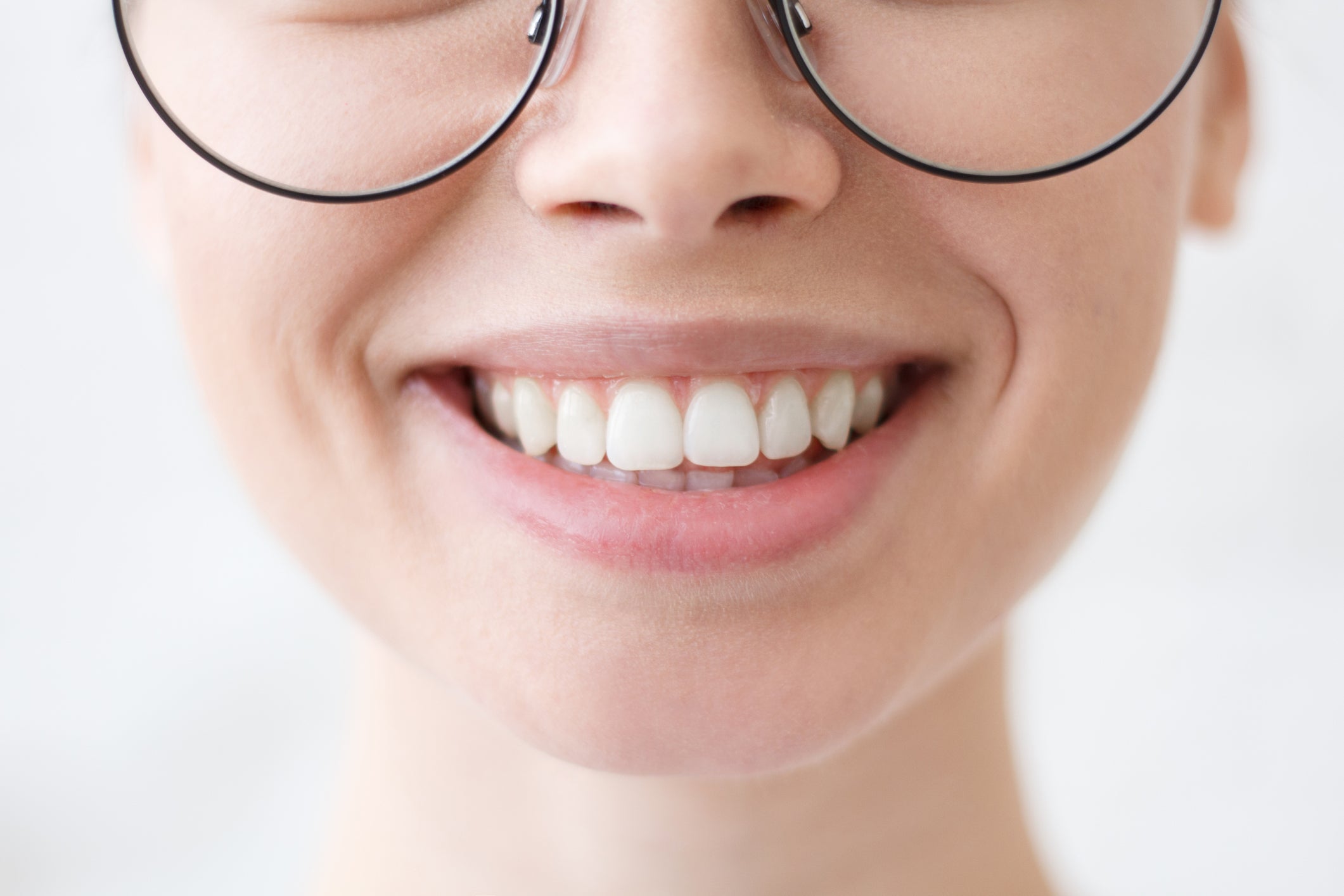
You may not think of your teeth as being alive, but they are. The outer shell, called the enamel, is the hardest substance in the human body. However, the nerves and blood vessels at the heart of your teeth are soft and vulnerable. If this inner layer (known as the pulp) becomes damaged, blood may stop flowing. A tooth with no blood flow is called a “dead” tooth. Without treatment, this tooth may become infected or abscessed and will eventually fall out.
What Causes a Dead Tooth?
Trauma or injury is a common reason for a tooth to die. Falling or being hit in the mouth can cut off the blood supply to a tooth or even cause blood vessels to burst. With no blood flow, the nerve inside the pulp dies.
Tooth decay is another possible cause. Without consistent dental hygiene habits, cavities can start to form. Left untreated, decay slowly eats through the tooth toward the sensitive pulp, eventually causing an infection. Inflammation may cut off blood flow to the pulp, causing the tooth to die.
How to Spot a Dead Tooth
It isn’t always easy to identify a dead tooth. Only a dental professional can pinpoint signs of restricted blood flow and a dying tooth in its early stages, which is why regular dentist visits are so important. Before long, though, the problem will soon become apparent.
Pain is the first symptom to watch out for. This may seem odd because the nerve inside your tooth is dead, but that’s not where the pain comes from. Bacteria and dead nerve remnants touching the extremely sensitive nerve endings around your tooth, called the periodontal membrane, are the source of your pain.
A change in color comes next. Dead teeth often darken over time as red blood cells die. This is very similar to developing a bruise. If a single tooth in your mouth gradually becomes yellow, gray, or black, visit the dentist right away.
Signs of infection could also appear if the dead tooth doesn’t receive treatment. You may notice swelling, a bad taste in your mouth, or an inflamed sore on your gums.
Treatment for a Dead Tooth
A root canal is the first option. Dentists want to avoid removing teeth whenever possible, and this procedure could save a dead or dying tooth. It involves removing all signs of decay and infection from deep within the tooth. Then, the dentist fills and seals it. In many cases, a crown is needed following a root canal.
Tooth extraction is the next choice. Even if your dentist can’t save your tooth, prompt treatment is necessary to avoid other complications. Once removed, you have several options for replacing the missing tooth, including an implant, bridge, or partial denture.
Park 56 Dental offers tooth care and smile restorations out of our spa-like, patient-centered New York dentist office. If you notice signs of a dead tooth, please contact us online or call us at (212) 826-2322 to schedule an appointment.
-
What is a Dental Bridge?
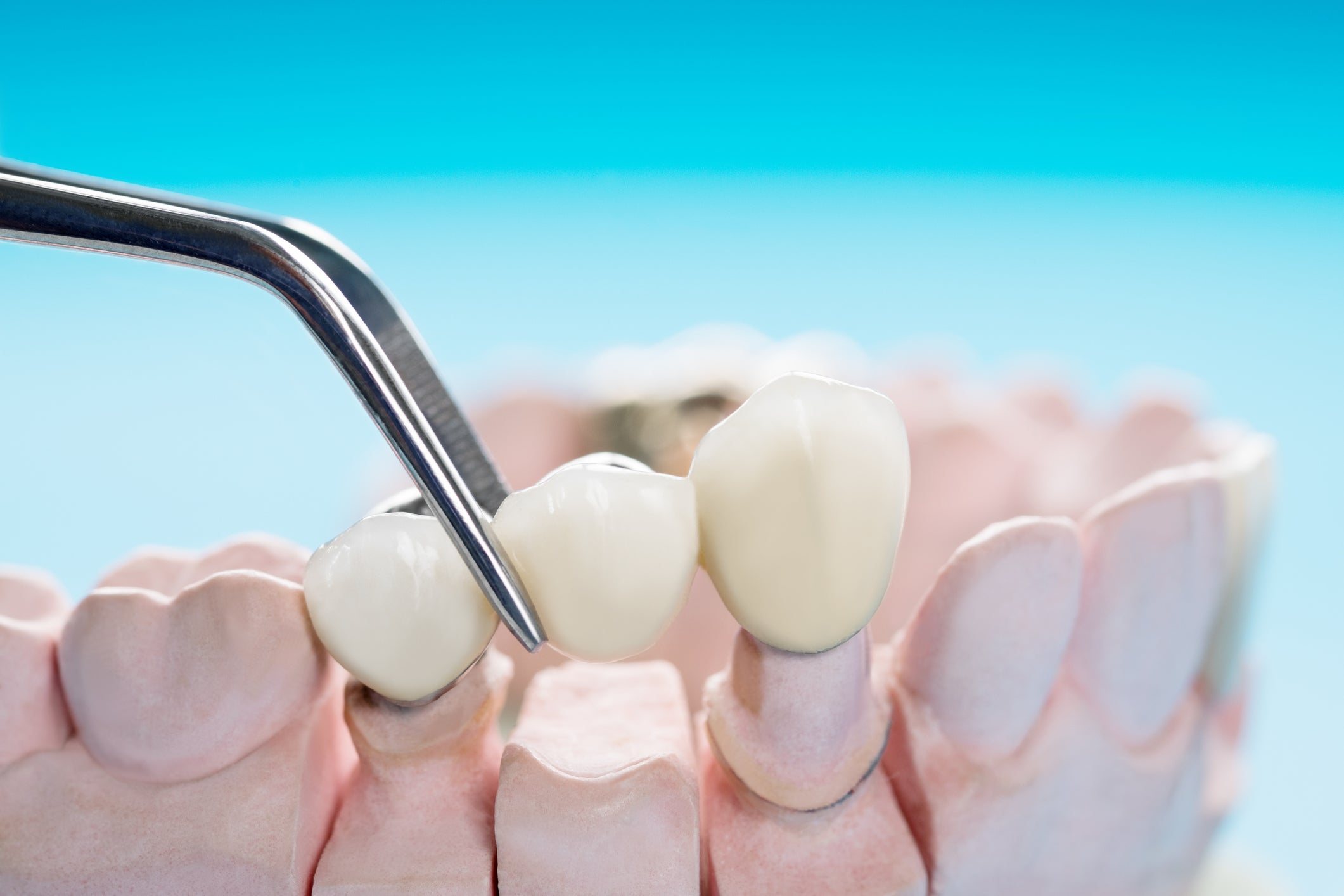
There are several options for replacing missing teeth, including dental bridges. Closing the gap in your smile can help prevent problems with your existing teeth and gums, including driting, bone loss, difficulty chewing, or speech problems. Learn more about dental bridges to help you decide if this is the right restorative treatment for you.
What is a Dental Bridge?
Dental bridges literally “bridge the gap” left by one or more missing teeth. A bridge is comprised of multiple parts:
- Crowns cap the teeth on either side of the gap, known as the abutment teeth.
- One or more false teeth, called pontics, are suspended between the crowns to replace the missing tooth or teeth.
- Crowns and pontics may be made of porcelain, alloys, gold, or other materials.
What is the Process of Receiving a Dental Bridge?
Your first visit with the dentist involves preparing the abutment teeth by removing some of the enamel. This creates room to place crowns, which serve as anchors for the pontic cemented between them.
During the same visit, your dentist takes an impression of your teeth to use as a model when creating custom pontics and crowns for your dental bridge. A temporary bridge protects your exposed teeth and gums until the permanent product is finished.
At your second appointment, the dentist removes the temporary bridge and puts the new pontic and crowns in place. Temporary cement ensures a comfortable fit. After a few weeks, you return to the dentist one final time to have the bridge firmly cemented in place.
Factors to Consider
When comparing bridges with other tooth-replacement options, keep these factors in mind:
- Time: You can complete the dental bridge process in two or three visits spaced within a few weeks of each other.
- Cost: While your insurance coverage determines what you pay out of pocket, bridges tend to be a middle-of-the-road option, with dentures costing less and implants costing more.
- Longevity: With excellent oral hygiene and regular checkups, dental bridges can last up to 15 years.
- Aesthetics: Pontics aren’t embedded in the gum line, so it may be possible to distinguish them from your natural teeth upon close inspection. For this reason, bridges often replace teeth toward the back of the mouth.
- Comfort: Bridges are not removable, so there’s no risk of slipping, which may exist with some types of dentures.
- Oral care: Whether you have a dental bridge or not, you should brush twice a day and floss once a day. If you have a bridge, your dentist may also recommend using antiseptic mouthwash and a special flossing tool to clean out debris from under the pontic.
Park 56 Dental is pleased to offer bridges and other smile restoration options to meet your diverse needs. We operate out of our spa-like, patient-centered New York office that makes going to the dentist a pleasure. Contact us online or call us at (212) 826-2322 to schedule a consultation for dental bridges in NYC today.
-
Tips to Reduce Dental Anxiety

Are you among the millions of Americans who avoid the dentist out of fear and anxiety? You might be nervous about feeling pain, being rushed to make a decision, incurring high costs, or having your concerns neglected. You might be especially prone to dental anxiety if you had a negative experience in the past.
Ironically, skipping routine cleanings could lead to oral health problems, resulting in more costly, in-depth treatment later on. Here are the top tips for reducing dental anxiety so you can take care of your smile without fear.
- Speak up: Tell your dentist about feeling anxious. It may be possible to adapt your treatment to make it more pleasant for you.
- Use hand signals: Inform your dentist that you will signal with your hands to communicate your needs. This gives you the right to raise your hand if you feel uncomfortable at any time. It’s perfectly acceptable to ask your dentist to ease off or pause the procedure.
- Focus on your breathing: If you’re nervous, you may involuntarily hold your breath. The resulting decrease in oxygen can make your anxiety worse. Close your eyes and focus on slow, regular breaths during your dental procedure.
- Listen to music: It can be helpful to shut out the world with a pair of headphones. Play your favorite album or listen to soothing songs to reduce your tension.
- Avoid caffeine and sugar before the appointment: These substances might make you even more jittery, so opt for a high-protein meal instead, which has a calming effect.
- Set a low-stress appointment time: Don’t schedule your dental visit at a time when you will feel rushed or under pressure. This might mean taking the day off work or setting a Saturday appointment so you can take your time without fear of running late.
- Try a new dentist: If your previous provider wasn’t sensitive to your needs, it might be time to find a different dentist. Ask friends and neighbors for recommendations to increase your confidence.
- Ask about sedation dentistry: Dental sedation is the best way to reduce stress for people who struggle with anxiety at the dentist. You don’t lose consciousness, but you become so relaxed that you feel completely at ease with the experience. Some patients even fall asleep in the dentist’s chair! Depending on the level of sedation you receive, you may also not remember the procedure afterward.
Park 56 Dental is pleased to help our patients overcome their fear of the dentist in our spa-like, patient-centered New York dentist office. We offer different levels of sedation to meet your needs, from inhaling nitrous oxide (laughing gas) to swallowing a pill to receiving conscious IV sedation with help from our board-certified anesthesiologist.
When you leave our office, you’ll feel so pampered—you won’t believe you once dreaded trips to the dentist! Contact us online or call us at (212) 826-2322 to learn more about our sedation dentistry options.
-
Why our Teeth Shift or Become Crooked
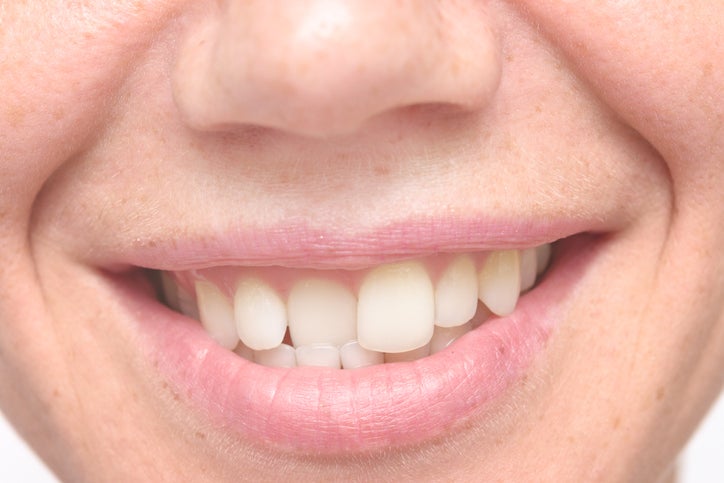
Have you noticed a shift in your bite? You might think that your teeth are firmly attached, but it’s actually very common for them to shift, becoming crooked or misaligned. What causes teeth to move around in your head? And what should you do about it?
- Sometimes baby teeth become crooked. It doesn’t necessarily mean the permanent teeth will be crooked, but in some situations it does. Baby teeth may just be crooked because they’re too small for the available gum space. If a child sucks a thumb or pacifier for too long, the baby teeth may become crooked, and if there is trauma to the mouth or tooth decay that causes a baby tooth to fall out prematurely, the permanent teeth may grow in crooked. If the baby teeth are crowded, the permanent teeth probably will be too. Genetics and heredity play a role, and poor dental habits and poor nutrition are sometimes the problem.
- Your jaw size may be to blame. Some scientists believe that our teeth often become overcrowded because our jaws have evolved to be smaller than they used to be. Interestingly, the lower jaw grows forward continually, throughout a person’s lifetime. This can cause the lower front teeth to bump into the upper front teeth, which either makes the top teeth spread out or the bottom teeth become crowded. On the other hand, the width of your lower jaw diminishes over the years, which also contributes to crowding of the lower teeth.
- Teeth can lose enamel and change shape. Whether it’s because of an injury or acid erosion, sometimes enamel is lost from your teeth, changing their shape. This can cause them to move out of alignment. Grinding the teeth, a condition called bruxism, can change the shape of the teeth as well.
- As you age, your teeth may shift. Aging causes bones, ligaments, and muscles to grow weaker. What’s more, the constant pressure of moving against each other can wear teeth down, causing them to shift and crowd.
Sometimes, there’s no reason to do anything about teeth that have shifted. Your quirky, crooked smile may just be part of who you are, and there’s nothing wrong with that. There are some factors, though, that would make it a good idea to move your teeth back where they belong. If it’s hard to chew, to speak, or to keep your teeth clean, or your crooked teeth are diminishing your confidence, there are many options available for straightening them.
At Park 56 Dental Group, we provide personalized, quality dental care in a spa-like environment. We offer pediatric, prosthodontics, endodontics, oral surgery, Invisalign®, emergency, and sedation dentistry, all at the highest level of treatment. We serve the Midtown, Central Park, Upper East Side, Park Avenue, and all surrounding Manhattan and New York areas, in a patient-centered practice with hours to fit your schedule. Schedule your complimentary consultation today by contacting us online or calling us at (212) 826-2322.
-
The Importance of Having your Cavities Filled

Even if you brush and floss religiously, doing your best to have pristine teeth and perfect oral health, you’re likely to one day have a cavity. If this happens, don’t delay treatment. It’s important to get any cavities filled as soon as possible, for many reasons.
- Tooth decay, left to its own devices, will spread. If you ignore a cavity, the decay will soon spread to the area around the cavity. Then you’ll not only have a bigger cavity than you originally had, but you may also have additional cavities as well. Getting it filled will solve the problem and keep the damage from spreading.
- Bacteria from a cavity is unlikely to stay in your mouth. An unhealthy tooth won’t just affect nearby teeth: it will spread bacteria as far as it can. Bacteria in your mouth is not ideal, but once it gets into your bloodstream and makes its way to other parts of the body, it can be extremely dangerous.
- Fillings keep your smile intact. If you don’t get a cavity filled in a timely manner, you may end up having to have the tooth removed entirely. Dental implants can solve the problem of missing teeth, but they’re much more expensive than fillings and require a much more complicated process. You’ll have a hole in your smile until you can get the implant, and this can compromise the bone in your jaw.
Those are pretty compelling reasons to get your cavities filled, but did you know there are different types of fillings? Each material used in fillings has its pros and cons, and your dentist will be able to help you determine which is right for you.
- Amalgam fillings have been around for over a century. They’re strong and ideal for cavities in the molars, because they can take the impact of chewing. Made of a combination of several metallic elements, they are sometimes visible when you laugh or smile, but they’re some of the least expensive cavity-filling materials.
- The other most common filling material is composite fillings. Sometimes called composite or filled resins, they’re made of a combination of glass or quartz filler. They can be made to match the color of your tooth, and they’re good in areas involved in moderate chewing.
- Metals, ceramic, and glass ionomer are also used as fillings. Gold and silver are often used, and these metallic fillings can last 10-15 years. Ceramic or porcelain fillings are attractive but expensive, and glass ionomer fillings can release fluoride to protect teeth but are less durable than other fillings.
At Park 56 Dental Group, we provide personalized, quality dental care, offering pediatric, prosthodontics, endodontics, oral surgery, Invisalign®, emergency, and sedation. We serve the Midtown, Central Park, Upper East Side, Park Avenue, and all surrounding Manhattan and New York areas, in a patient-centered practice with hours to fit your schedule. Schedule your complimentary consultation by contacting us online or calling (212) 826-2322.
RECENT POSTS
categories
- Uncategorized
- Cosmetic Dentistry
- Veneers
- Healthier Teeth
- Teeth Whitening
- Dental Health
- Video
- Dental Emergencies
- Invisalign
- Dental Implants
- Root Canal
- Sedation Dentistry
- Infographic
- Dental Crowns and Bridges
- Dental Anxiety
- Gum Disease
- COVID-19
- Bad Breath
- New York Dentist
- Cut out sugar
- General Dentistry
- Oral Health
- Oral Cancer
- Dry Mouth
- Gum Health
- Toothache
- Dental Sealants
- Cavities
